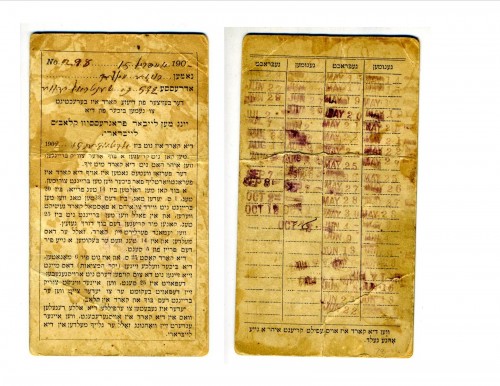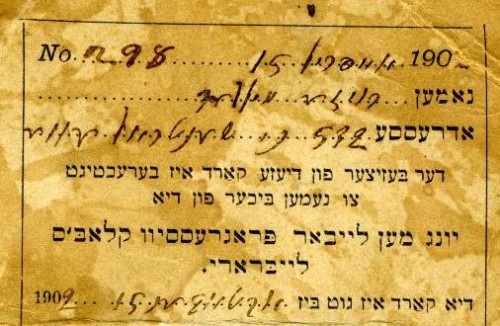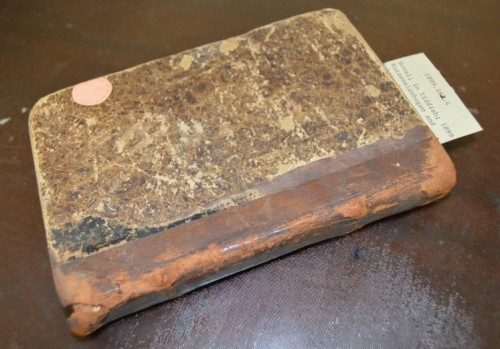Do You Have Your Library Card?
A blog post by Collections Manager Joanna Church. To read more posts by Joanna click HERE.
September is National Library Card Sign-Up Month so, as a proud member of the (exceptionally nerdy) club of people who have memorized their library card number, I though I’d share the oldest example in our collection: a card permitting the borrowing of books from the library of the Young Men’s Progressive Labor Club of Baltimore, 1902.

Front (left) and back of a Yiddish library card issued by the Young Men’s Progressive Labor Club, 1902. Gift of Barbara (Mrs. Howard) Merker. JMM 1978.16.1
The front of the card includes space for the borrower’s name and address, along with the terms and privileges of being a card-holder; the back indicates the dates that books were borrowed and returned. We have not yet fully translated the card (if anyone wants to have a go, please feel free to send us a translation!) but, as best we can tell, card No. 298 belonged to one Rosa Malka of 532 N. Central Avenue.

JMM 1978.16.1
Unfortunately, I have not been able to pin Rosa down. According to the 1901 Baltimore City Directory, a Hyman Levy, plasterer, lived at 532 N. Central. In the 1900 census, the Levy family is listed at this address – but there’s no Rose or Rosa among them. In the 1903 City Directory, a man named Alex Hammond, laborer, is at the address; I can’t find him in the census, and he doesn’t seem quite as likely to have had a wife or daughter reading Yiddish books at the Young Men’s Progressive Labor Club. Without easy access to a 1902 City Directory* I have to guess that either another family lived at the address between the Levys and Mr. Hammond, or that one of the Levy family women – wife Annie, and daughters Rachel (age 10 in 1900) and Bessie (age 12) – had the Hebrew name Rosa Malka. (The third possibility is that we misread the street name; if anyone has another suggestion, I’d be happy to pursue it.) The donor of the card noted only that it was found “among old family books,” and so far I have not found any definite connections.
The date stamps on the back do not tell us the titles of the books Rosa checked out, and without an exact translation of the terms on the front, I’m only guessing that the rules allowed you to borrow one book at a time, getting a date stamp in the first column for check-out and a stamp in the second when it was returned. If that was the case, you can see that between May and October, Rosa read a book every one-two days: a girl after my own heart.
Coincidentally, our collections also include five books from the Young Men’s Progressive Labor Club library, “found in the basement of a Highlandtown rowhouse.” Four of the library books are novels and plays written in Yiddish, but one – my favorite – is a copy of Camille translated into Yiddish. All five of the books, published in New York City in the late 19th century, are stamped in English with variations on “Young Men’s Progressive Labor Club, Baltimore, Md. Organized July 10 1896”, and all and show a great deal of wear – as library books frequently do.

An exceedingly well-read copy of Camille in Yiddish, published by Judah Katzenelenbogen, New York, in 1899. One of five books stamped with the name “Young Men’s Progressive Labor Club.” Gift of Orrin Yesko. JMM 1999.162.4
The Young Men’s Progressive Labor Club is not well-documented, but happily several of these five books also include a stamp giving a slightly different version of the name: “Progressive Club Branch No. 9 of the Workmen’s Circle, Organized July 10, 1896, Baltimore, MD.” The Workmen’s Circle is more well-known, and in fact we have some later Workmen’s Circle library circulation materials in our collections as well … but those will have to wait for another blog post.
*I’d be happy to consult a 1902 directory, but we don’t have one here, and it’s not yet digitized through this extremely useful link at the University of Maryland Library.
